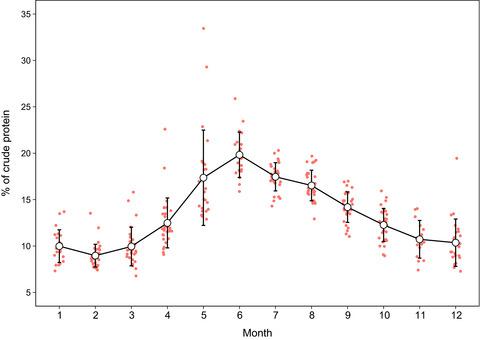当前位置:
X-MOL 学术
›
Ecol. Evol.
›
论文详情
Our official English website, www.x-mol.net, welcomes your feedback! (Note: you will need to create a separate account there.)
Anonymous fecal sampling and NIRS studies of diet quality: Problem or opportunity?
Ecology and Evolution ( IF 2.6 ) Pub Date : 2020-05-26 , DOI: 10.1002/ece3.6354 Luca Corlatti 1
Ecology and Evolution ( IF 2.6 ) Pub Date : 2020-05-26 , DOI: 10.1002/ece3.6354 Luca Corlatti 1
Affiliation

|
Investigating the drivers of diet quality is a key issue in wildlife ecology and conservation. Fecal near infrared reflectance spectroscopy (f‐NIRS) is widely used to assess dietary quality since it allows for noninvasive, rapid, and low‐cost analysis of nutrients. Samples for f‐NIRS can be collected and analyzed with or without knowledge of animal identities. While anonymous sampling allows to reduce the costs of individual identification, as it neither requires physical captures nor DNA genotyping, it neglects the potential effects of individual variation. As a consequence, regression models fitted to investigate the drivers of dietary quality may suffer severe issues of pseudoreplication. I investigated the relationship between crude protein and ecological predictors at different time periods to assess the level of individual heterogeneity in diet quality of 22 marked chamois Rupicapra rupicapra monitored over 2 years. Models with and without individual grouping effect were fitted to simulate identifiable and anonymous fecal sampling, and model estimates were compared to evaluate the consequences of anonymizing data collection and analysis. The variance explained by the individual random effect and the value of diet repeatability varied with seasons and peaked in winter. Despite the occurrence of individual variation in dietary quality, ecological parameter estimates under identifiable or anonymous sampling were consistently similar. This study suggests that anonymous fecal sampling may provide robust estimates of the relationship between dietary quality and ecological correlates. However, since the level of individual heterogeneity in dietary quality may vary with species‐ or study‐specific features, inconsequential pseudoreplication should not be assumed in other taxa. When individual differences are known to be inconsequential, anonymous sampling allows to optimize the trade‐off between sampling intensity and representativeness. When pseudoreplication is consequential, however, no conclusive remedy exists to effectively resolve nonindependence.
中文翻译:

匿名粪便采样和NIRS对饮食质量的研究:问题还是机会?
调查饮食质量的驱动因素是野生生物生态和保护的关键问题。粪便近红外反射光谱法(f-NIRS)被广泛用于评估饮食质量,因为它可以对营养成分进行无创,快速和低成本的分析。可在有或没有动物身份知识的情况下收集和分析f-NIRS的样品。尽管匿名采样可以减少个人识别的成本,但由于它既不需要物理捕获也不需要DNA基因分型,但它却忽略了个体变异的潜在影响。结果,适合调查饮食质量驱动因素的回归模型可能会遭受严重的假复制问题。卢比卡普监控超过2年。拟合具有和没有个体分组效应的模型以模拟可识别的匿名粪便采样,并比较模型估计值以评估匿名数据收集和分析的后果。由个体随机效应解释的差异和饮食重复性的价值随季节而变化,并在冬季达到顶峰。尽管饮食质量存在个体差异,但在可识别或匿名抽样下的生态参数估计值始终相似。这项研究表明,匿名粪便采样可以提供有关饮食质量与生态相关性之间关系的可靠估计。但是,由于个体饮食质量的异质性水平可能会因物种或研究特定特征而异,其他类群中不应假定无关紧要的伪复制。当已知个体差异无关紧要时,匿名抽样可以优化抽样强度和代表性之间的权衡。但是,当伪复制是必然的时,就没有有效解决非独立性的决定性补救措施。
更新日期:2020-06-26
中文翻译:

匿名粪便采样和NIRS对饮食质量的研究:问题还是机会?
调查饮食质量的驱动因素是野生生物生态和保护的关键问题。粪便近红外反射光谱法(f-NIRS)被广泛用于评估饮食质量,因为它可以对营养成分进行无创,快速和低成本的分析。可在有或没有动物身份知识的情况下收集和分析f-NIRS的样品。尽管匿名采样可以减少个人识别的成本,但由于它既不需要物理捕获也不需要DNA基因分型,但它却忽略了个体变异的潜在影响。结果,适合调查饮食质量驱动因素的回归模型可能会遭受严重的假复制问题。卢比卡普监控超过2年。拟合具有和没有个体分组效应的模型以模拟可识别的匿名粪便采样,并比较模型估计值以评估匿名数据收集和分析的后果。由个体随机效应解释的差异和饮食重复性的价值随季节而变化,并在冬季达到顶峰。尽管饮食质量存在个体差异,但在可识别或匿名抽样下的生态参数估计值始终相似。这项研究表明,匿名粪便采样可以提供有关饮食质量与生态相关性之间关系的可靠估计。但是,由于个体饮食质量的异质性水平可能会因物种或研究特定特征而异,其他类群中不应假定无关紧要的伪复制。当已知个体差异无关紧要时,匿名抽样可以优化抽样强度和代表性之间的权衡。但是,当伪复制是必然的时,就没有有效解决非独立性的决定性补救措施。


























 京公网安备 11010802027423号
京公网安备 11010802027423号